A Letter from Kosovo - "The Return of Karl May" by Jeton Neziraj, commissioned by Volksbühne's "PostWest" festival, premieres in Prishtina
Handke And The Frog
by Natasha Tripney
Prishtina / Kosovo, October 2020. Jeton Neziraj's new play "The Return of Karl May", a co-production between Berlin’s Volksbühne, Kosovo's Qendra Multimedia and the National Theatre of Kosovo, was the first play to premiere in Prishtina after theatres were allowed to reopen earlier this month. The play's journey to the stage has not been straightforward, though that’s true of most productions this year. It is was originally intended to premiere in Berlin in May, as part of the Volksbühne's PostWest Festival, a transcultural theatre festival intended to bring together artists from ten countries in eastern Europe in order to interrogate what it means to be 'Eastern European' as well as, according to curator Alina Aleshchenko, to create a space for "cooperation and exchange" between theatre makers from these countries.
Western Stereotypes about the East
Jeton Neziraj is the former artistic director of the National Theatre of Kosovo. His work often explores hypocrisy and abuse of power in Kosovo, in the construction industry, in the health system. His work has been staged in New York and Los Angeles as well as theatres throughout Europe. For the Volksbühne, he turned his attention to Germany, drawing inspiration from the work of the popular 19th century author Karl May, the creator of Old Shatterhand. He set out to use the character of Kara Ben Nemsi, the adventurer whose travels took him to, among other places, Albania – in "Durch das Land der Skipetaren" – as a conduit for exploring stereotypes that still exist in the West about the East.
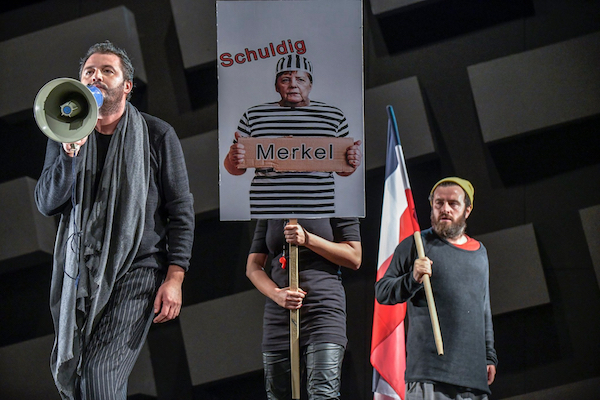 Parading East-Western stereotypes: Adrian Morina, Arta Mucaj and Shpetim Selmani © Atdhe Mulla
Parading East-Western stereotypes: Adrian Morina, Arta Mucaj and Shpetim Selmani © Atdhe Mulla
Blerta Neziraj, Jeton Neziraj’s wife and regular creative collaborator, has directed "The Return of Karl May". May's writing, she explains, is "full of stereotypes and prejudices for Albanians and for the other people of the Balkans." In the books even Kara Ben Nemsi's horse Rihi is much smarter than the Albanians he meets during his journey.
Subtitled 'an entertaining play for German people', "The Return of Karl May" opens with the National Theatre of Kosovo dispatching a troupe of actors on a quest to Berlin – the Volksbühne is in trouble and Kosovars are good at conflict resolution, the play jokes – and also to educate a German audience that, in the world of the play, still thinks of the Balkans like the Wild West, lawless and chaotic.
A journey across Europe
The resurrected Kara Ben Nemsi is played by Armend Smalji. His horse Rihi, now a frog - for budgetary reasons according to the text, as a horse would be too expensive – is played by Arta Muçaj. Smalji and Mucaj are both well-known Albanian actors from Kosovo who regularly perform on the National Theatre stage. Mucaj is concurrently starring in a new musical version of "Spring Awakening", where Wedekind’s play is being relocated to 1990s Kosovo. The "Karl May" ensemble is completed by Adrian Morina, Ylber Bardhi and Shpetim Selmani, the latter also a poet who recently received the EU Prize for Literature.
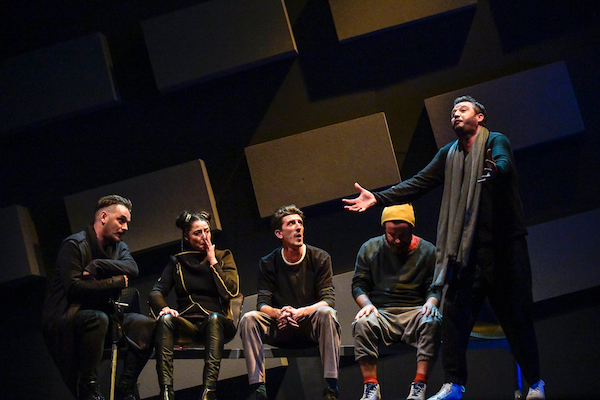 "The Return of Karl May": Armend Smajli, Arta Mucaj, Ylber Bardhi, Shpetim Selmani, Adrian Morina © Atdhe Mulla
"The Return of Karl May": Armend Smajli, Arta Mucaj, Ylber Bardhi, Shpetim Selmani, Adrian Morina © Atdhe Mulla
In the play, Kara Ben Nemsi and the Kosovar actors embark on a journey across Europe, crossing border after border and encountering a group of Syrian refugees along the way, prompting the comment from one character that: "The Europeans only love refugees on stage, as fiction, not in reality."
Comical German obsession with Karl May
When the play was commissioned, Volksbühne supplied lengthy and detailed technical information about the ways in which the space could be used, which Jeton Neziraj found amusing. "The technicians there told us that the actors on stage could not empty even a glass of water, nor light a cigarette – even an electronic cigarette."
As a result of these 'differences', he says, "it was clear that the play I was going to write would be a comedy." His decision to write about Karl May sealed things. "The Germans' own obsession with May's books is comical."
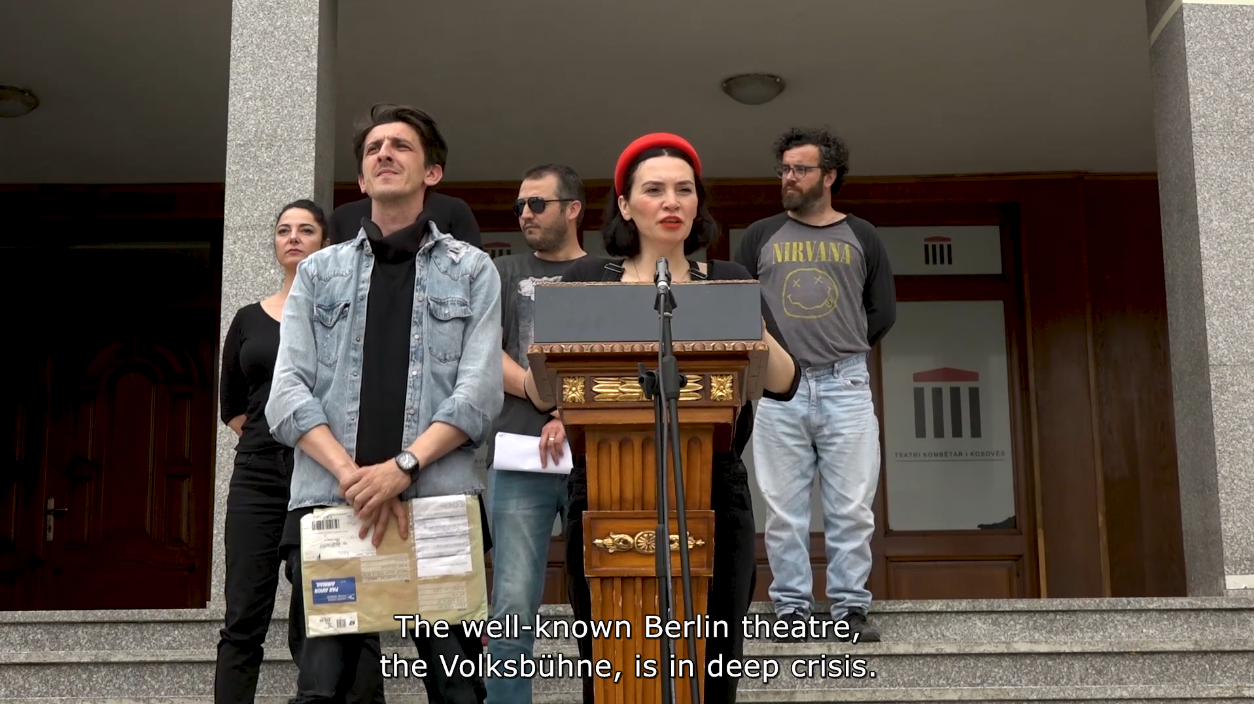 Screenshot of the film the team made for the PostWest festival
Screenshot of the film the team made for the PostWest festival
The play jokingly asserts that it is post-everything: post-dramatic, post-truth, post-migrant. "Sometimes it is satiric, sometimes it is ironic, parodic, sometimes it is drama,” explains Armend Smalji. "I play Kara Ben Nemsi and at the same time I play an actor playing Kara Ben Nemsi." As an actor, he says, "you have to be vigilant and focused to know exactly what feeling you should have in each scene." The play is not, says Blerta Neziraj, the easiest play to direct. "Its content is complicated with many layers and references, which I did not want to lose."
European arrogance and hypocrisy
In the beginning the tone is broadly comic, but it shifts in tone midway through, turning its attention to the decision to award the Nobel Prize to Peter Handke, the Austrian author who has been vocal in his support of Serbia during the wars of the 1990s. The poem that Handke read at Slobodan Milosevic's funeral is incorporated into the text. Handke's Nobel win was, says Neziraj, one of the "most obvious examples of European arrogance and hypocrisy". To him, a thread runs between the two writers. May, he says, "was a supremacist at a time when that thing was _'in'_ among Westerners, while Handke is a current fascist, at a time when fascism is officially punishable."
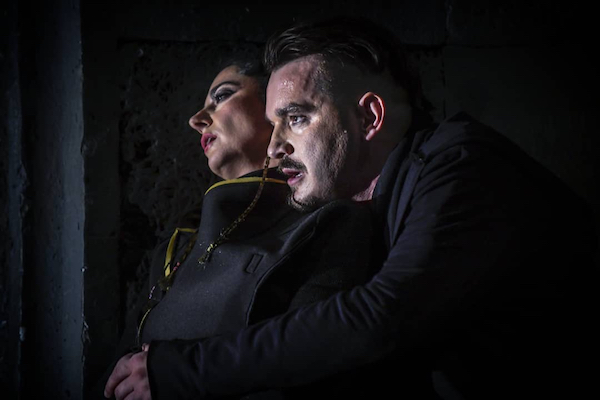 Arta Mucaj and Armend Smajli in "The Return of Karl May" © Atdhe Mulla
Arta Mucaj and Armend Smajli in "The Return of Karl May" © Atdhe Mulla
For Arta Muçaj, these shifts in tone, from comedy to something far more emotionally charged and politically resonant, presented challenges as a performer. "It was hard process for us actors. It needs a lot of energy physically and mentally." The play goes to some dark places and requires its cast to do the same. "We can’t forget what we went through as a nation and what still are going through with politics", she says.
"A battle to show the true power of theatre"
Just as rehearsals were about to begin, and with shared set already built, Covid-19 brought the process to a halt. Like many countries in the region, Kosovo swiftly imposed emergency measures. A curfew was implemented, the hours people could leave their homes was severely restricted and theatres, along with all other cultural spaces, closed their doors. Then on 25th March, a no-confidence vote was taken against the then prime minister Albin Kurti, who had only been in the role since February of this year, with the result that he was voted out of power, ostensibly because of his handling of the pandemic.
For Volksbühne's PostWest festival that decided to go digital, Blerta Neziraj created a film with an extract of 40 minutes of the play, shot as if in rehearsal. Though film is, she says, a medium outside her comfort zone, the resulting video, filmed in rooms around the empty National Theatre building, has an irreverent and improvisational energy. In one scene, as a protest in response to Albin Kurti's removal took place in the square outside the theatre, the cast clambered out onto the roof to deliver their lines, with the crowd chanting in the background.
Even if the film was a success with the German audience so much so that Blerta Neziraj feared that people might like the actual play less, it was important to Jeton Neziraj that they made the premiere happen this year. He describes it as "a battle to show the true power of theatre". This moment of triumph may be temporary and the lockdown measures may soon return, but, he says, “we all deserve a bit of freedom. And where could you find more freedom than in theatre?"
The Return of Karl May / Kthimi i Karl Majit
(An entertaining play for the German people) / (Shfaqje argëtuese për popullin gjerman)
by Jeton Neziraj
Directed by: Blerta Neziraj, Stage and Costumes: Jelisaveta Tatić Čuturilo, Choreography: Gjergj Prevazi, Music Composer: Gabriele Marangoni, Dramaturge and Artistic Collaborator: Alban Beqiraj, Collaborator for Scenography: Mentor Berisha, Video: Ilir Gjocaj, Stage Manager: Lendita Idrizi, International Outreach: Maud Dinand, Coordination: Beqir Beqiri, Translation into English: Alexandra Channer, Lights: Mursel Bekteshi, Yann Perregaux
Cast: Arta Muçaj, Adrian Morina, Armend Smajli, Ylber Bardhi, Shpetim Selmani
Premiere: October 16, 2020 at 20:00 at the National Theater of Kosovo
qendra.org
Find the German Translation of Natasha Tripney's text here.
Natasha Tripney is the lead critic and reviews editor of The Stage, the newspaper of the UK theatre industry. She's the co-founder of Exeunt, an online platform for theatre criticism, and writes regularly about theatre and the arts for publications including the Guardian, Independent, and Kosovo 2.0.
Für Horizonterweiterung
Der Blick über den eigenen Tellerrand hinaus ist uns wichtig. Wir möchten auch in Zukunft über relevante Entwicklungen und Ereignisse in anderen Ländern schreiben. Unterstützen Sie unsere internationale Theaterberichterstattung.
meldungen >
- 17. April 2024 Autor und Regisseur René Pollesch in Berlin beigesetzt
- 17. April 2024 London: Die Sieger der Olivier Awards 2024
- 17. April 2024 Dresden: Mäzen Bernhard von Loeffelholz verstorben
- 15. April 2024 Würzburg: Intendant Markus Trabusch geht
- 15. April 2024 Französischer Kulturorden für Elfriede Jelinek
- 13. April 2024 Braunschweig: LOT-Theater stellt Betrieb ein
- 13. April 2024 Theater Hagen: Neuer Intendant ernannt
- 12. April 2024 Landesbühnentage 2024 erstmals dezentral


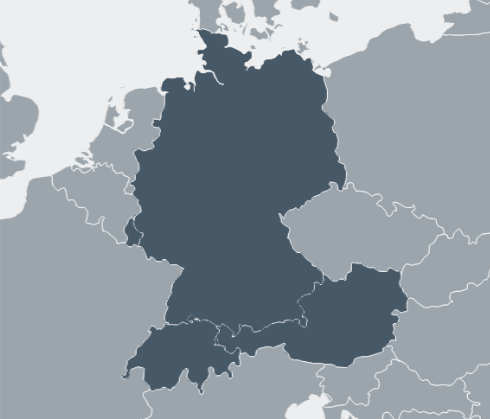
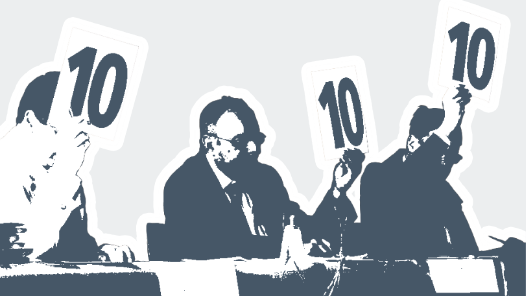
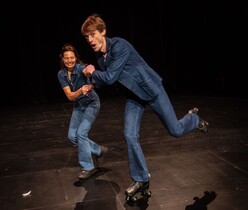



neueste kommentare >